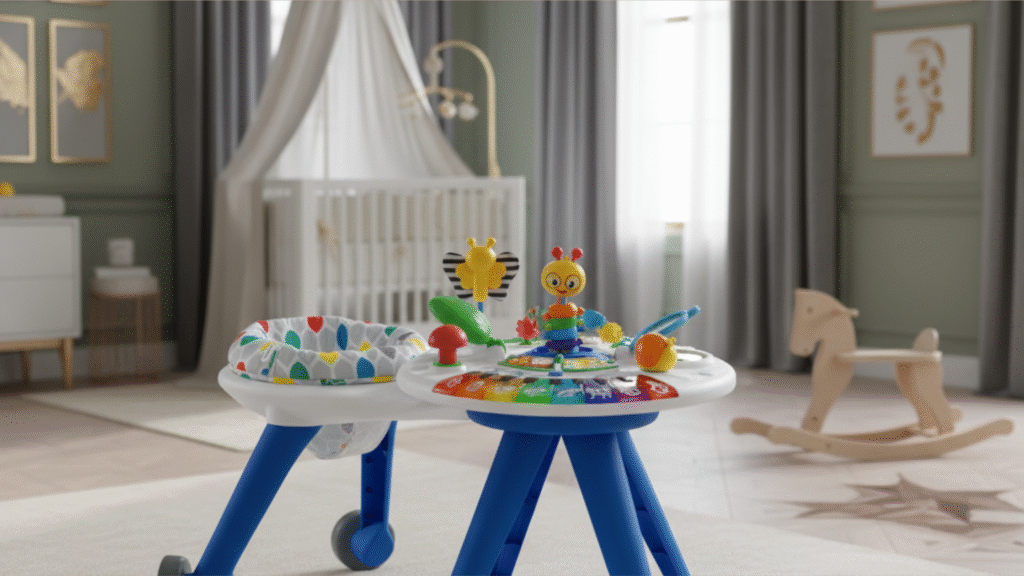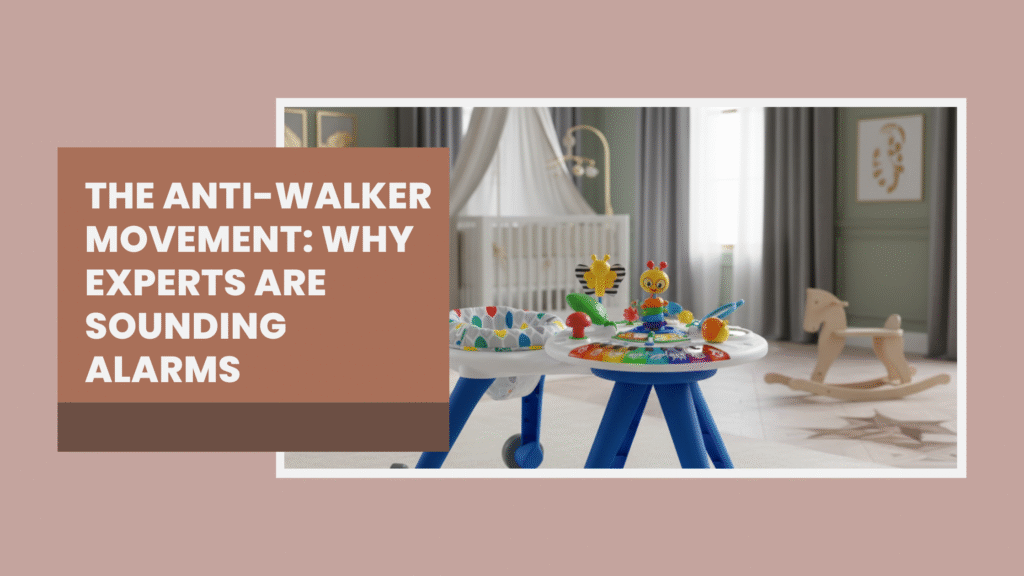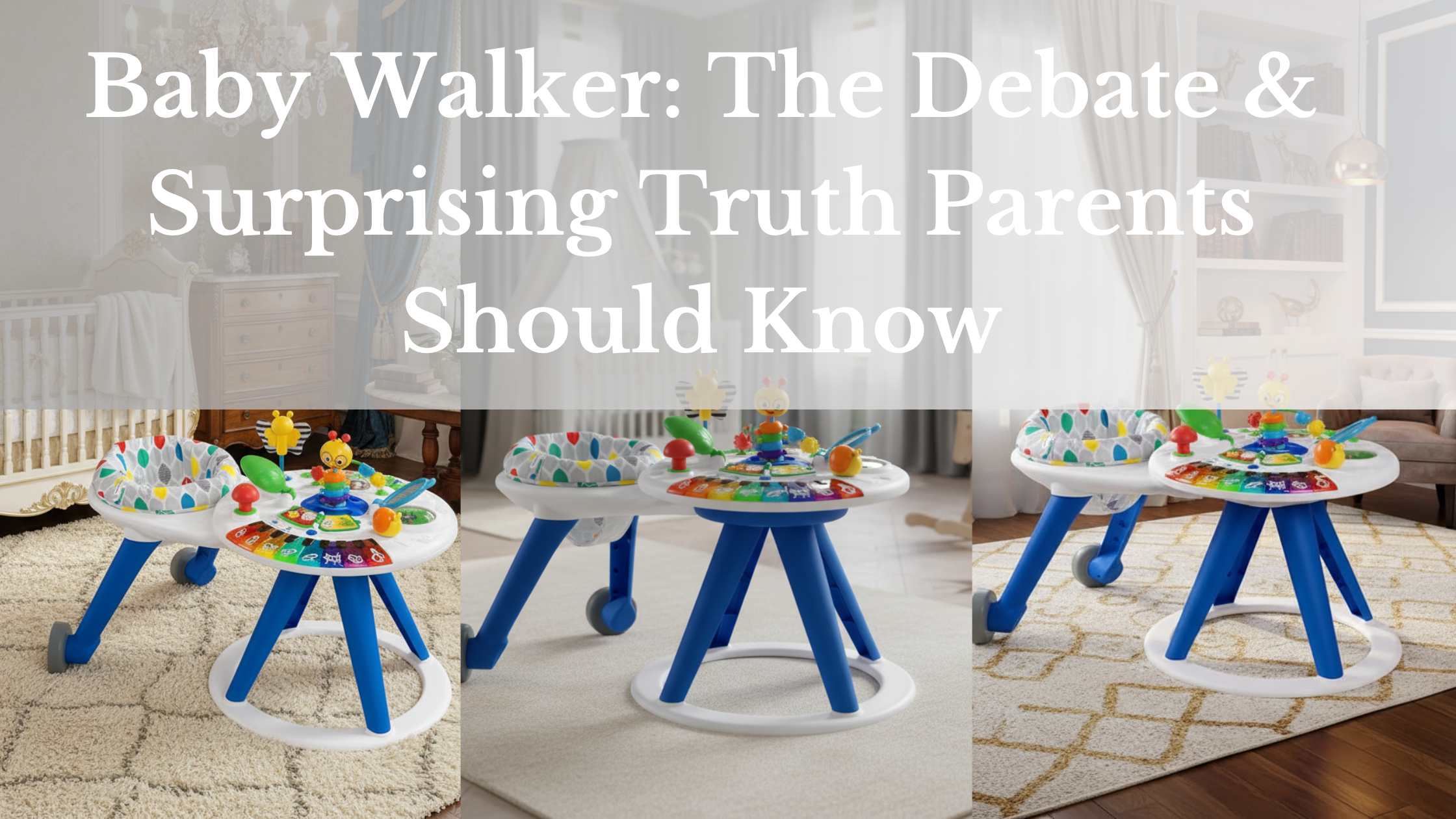Discover the heated debate on baby walkers—are they helpful or harmful? Learn surprising expert insights on development, safety risks, and what parents really need to know before making a choice for their little one. Stay informed and keep your baby safe.
Picture this: you’re scrolling through social media & you see your friend’s adorable baby zooming around in a colorful walker, giggling with pure joy. Your heart melts, & you think, “I NEED to get one of these for my little one!” But then your mother-in-law calls & warns you about the “dangers” of baby walkers. Your pediatrician friend mentions something about developmental delays. Suddenly, you’re stuck in the middle of one of the most CONTROVERSIAL parenting debates of our time.
Baby walkers have become the topic that can turn a peaceful playdate into a battlefield. Some parents swear by them, claiming they’re lifesavers that give babies independence & parents a much-needed break. Others argue they’re dangerous devices that should be banned from every household. The debate is so intense that some countries have actually made them illegal!
This isn’t just about a simple baby product – it’s about safety, development, & parenting choices that can feel overwhelming. We’re going to dive deep into what the REAL experts are saying, examine both sides of this heated argument, & help you figure out what’s best for your family. Get ready to discover some surprising facts that might completely change how you think about baby walkers.

The PRO-Walker Camp: Why Some Parents Are OBSESSED
Parents who love baby walkers have some pretty convincing arguments. Sarah, a mom of three from Texas, says her walker was a “game-changer” during her youngest child’s fussy phase. “My daughter would cry constantly until I put her in that walker,” she explains. “Suddenly, she could explore, reach toys, & see the world from a standing position. The transformation was AMAZING!”
The entertainment factor is huge for many families. Modern baby walkers come loaded with lights, sounds, music, & interactive toys that can keep babies occupied for extended periods. This gives parents precious time to cook dinner, fold laundry, or simply catch their breath. For parents juggling multiple children or working from home, this break can feel like a miracle.
Many parents also believe walkers help their babies learn to walk faster. The logic seems simple: if babies practice standing & moving their legs in a walker, they’ll develop the muscles & coordination needed for independent walking. Some parents report their walker-using babies took their first steps earlier than expected. This apparent head start can make parents feel proud & confident in their choice.
The mobility aspect is another major selling point. Babies who can’t yet crawl or walk independently suddenly gain the ability to move around & explore their environment. They can follow parents from room to room, investigate different areas of the house, & feel more included in family activities. This newfound freedom often leads to happier, more content babies, which means less crying & frustration for everyone.
The ANTI-Walker Movement: Why Experts Are Sounding ALARMS
The American Academy of Pediatrics has taken a strong stance AGAINST baby walkers, & their reasons might surprise you. Dr. Jennifer Martinez, a pediatric physical therapist with over 15 years of experience, explains that walkers can actually DELAY walking rather than help it. “When babies are in walkers, they’re not developing the same muscle groups & balance skills they need for independent walking,” she says. “They’re essentially bouncing & scooting rather than learning proper walking mechanics.”
The injury statistics are pretty scary too. Emergency rooms see thousands of walker-related injuries every year. Babies can tip over, fall down stairs, reach dangerous objects they normally couldn’t access, & move much faster than parents expect. The Consumer Product Safety Commission reports that walker injuries often involve serious head trauma & fractures. Some accidents happen so quickly that even attentive parents can’t prevent them.
Developmental concerns go beyond just walking. Physical therapists worry that walkers prevent babies from going through important developmental stages like crawling, which helps build core strength & coordination. When babies skip or rush through these stages, they might struggle with other skills later on. Some experts believe excessive walker use can lead to problems with balance, spatial awareness, & even learning difficulties down the road.
The walker position itself is problematic according to many specialists. Babies in walkers are held upright artificially, which doesn’t allow their hip & leg muscles to develop naturally. They’re also walking on their toes rather than learning the heel-to-toe motion of normal walking. This unnatural positioning can create bad habits that are hard to break later.

What the LATEST Research Actually Shows
Recent studies have provided some eye-opening insights that might settle this debate once & for all. A comprehensive study published in the Journal of Developmental & Behavioral Pediatrics followed over 100 babies for two years. The results were surprising: babies who used walkers extensively actually walked independently an average of 3-4 weeks LATER than babies who never used walkers.
Canadian researchers conducted an even more detailed study that looked at both short-term & long-term effects. They found that babies who spent more than two hours daily in walkers showed delayed motor development in multiple areas. These babies were slower to sit without support, crawl, & walk independently. Even more concerning, some of these delays persisted for months after walker use stopped.
The injury data from countries that banned walkers is particularly telling. Canada prohibited the sale & importation of baby walkers in 2004, & walker-related injuries dropped to virtually zero overnight. Before the ban, Canadian emergency rooms treated about 100 walker injuries monthly. After the ban, these injuries became extremely rare, proving that elimination really works.
However, some newer research suggests that LIMITED walker use might not be as harmful as previously thought. A small study found that babies who used walkers for less than 30 minutes daily showed minimal developmental delays. This has led some experts to suggest that moderation might be key, though most still recommend avoiding walkers entirely.
Interestingly, cultural differences play a role too. Countries where floor time & natural movement are prioritized tend to have earlier walking ages & fewer developmental delays. This supports the idea that allowing babies to move & explore naturally is more beneficial than using devices that artificially support them.
Making the RIGHT Choice for YOUR Family
So where does this leave confused parents trying to make the best decision? The answer isn’t as black & white as either side might want you to believe. Every family’s situation is different, & what works for one might not work for another.
If you’re considering a walker, start by honestly evaluating your specific needs & circumstances. Are you looking for entertainment, a break, or hoping to help your baby walk sooner? Understanding your motivations can help you explore safer alternatives that might achieve the same goals. For entertainment, stationary activity centers provide similar stimulation without the mobility risks. For breaks, baby-proofed play areas might give you the breathing room you need.
Safety should be your top priority regardless of your decision. If you do choose to use a walker, never leave your baby unattended, block off all stairs with gates, & limit use to 15-20 minutes at a time. Remove or secure any dangerous objects within your baby’s expanded reach, & always supervise closely. Remember that babies in walkers can move surprisingly fast & reach places you might not expect.
Consider your baby’s individual development too. Some babies are naturally more active & might benefit from the contained mobility a walker provides. Others might be content with floor time & don’t need the extra stimulation. Pay attention to your baby’s cues & preferences rather than following what worked for other families.
The most important thing to remember is that there are many ways to support your baby’s development that don’t involve walkers at all. Tummy time, crawling, cruising along furniture, & simply playing on the floor all contribute to healthy motor development. These natural activities build the strength, balance, & coordination babies need for walking without any safety risks.
The BOTTOM Line: What Parents Really Need to Know
After examining all the evidence, expert opinions, & real parent experiences, the baby walker debate comes down to weighing risks against benefits – & for most families, the risks seem to outweigh any potential advantages. The scientific evidence is pretty clear that walkers don’t help babies walk sooner & might actually delay this milestone. The safety concerns are real & serious, with thousands of injuries occurring each year.
But this doesn’t mean parents who choose walkers are making terrible decisions. Every family has different needs, living situations, & challenges. The key is making an INFORMED choice based on facts rather than marketing claims or peer pressure. If you do decide to use a walker, understanding the risks & taking proper precautions can help keep your baby safer.
The bigger picture here is about trusting your baby’s natural development process. Babies are designed to develop at their own pace, & most will walk when they’re ready regardless of the devices we use. Supporting this natural process through safe exploration, plenty of floor time, & age-appropriate activities is probably the best approach for most families.
Whatever you decide, remember that you’re not alone in this debate. Millions of parents are wrestling with the same questions & concerns. The most important thing is that you’re thinking carefully about your choices & putting your baby’s safety & development first. That’s what good parenting really looks like, walker or no walker.




